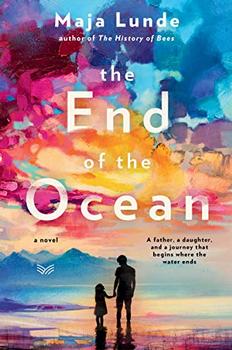Summary | Excerpt | Reviews | Beyond the book | Read-Alikes | Genres & Themes | Author Bio

In The History of Bees, her debut novel for adults, internationally bestselling Norwegian writer Maja Lunde imagined a dystopian future in which the world's bees—essential pollinators for agricultural crops—have been wiped out by global warming. The End of the Ocean, ably translated by Diane Oatley, returns to the theme of climate change, this time tackling the environmental threats to our most precious resource: water.
In 2017, 70-year-old Signe, a lifelong environmental activist, returns to her hometown in Norway, where thousand-year-old ice caps are melting at an alarming rate because of rising temperatures. Even as the glaciers recede, a perverse business venture is underway to excavate them, extracting ice to be sold as a luxury commodity to rich oil sheiks in the Persian Gulf. The rage Signe feels at this wanton destruction merges with a sense of personal betrayal: Magnus, the businessman who approved the scheme, is her former boyfriend, the love of her life who once shared her ideals. Haunted by memories of her past, Signe embarks on a solo journey by sailboat to confront Magnus in his vacation cottage in France.
With flashbacks and reminiscences that mimic the ebb and flow of internal monologue, the book weaves together Signe's past and present, tracing the backstory leading up to her solitary journey. As Signe reflects on the disappointments and bitter losses of her life—the dashed ideals of her youthful activism, the collapse of her relationship with Magnus, her estrangement from her mother—her treacherous voyage across stormy seas becomes a personal reckoning with her past, an aging woman's quest to take stock of her life and to come to terms with an unraveling world she is helpless to do anything about. "I have been fighting my entire life, but I have been mostly alone," she laments. "There are so few of us, it was futile."
A parallel storyline, told in alternating chapters, transports us to a water-starved Earth in the near future. It's the year 2041, and the catastrophic effects of global warming (see Beyond the Book) that Signe and the environmentalists of her day warned about have already become a reality. Separated from the rest of their family, 25-year-old David and his young daughter Lou trek across a drought-stricken southern Europe, seeking safe haven in a camp for climate refugees. The father and daughter's story intersects with Signe's when they stumble upon her long-abandoned sailboat in a deserted, sun-scorched French town, miles from the shore.
David and Lou's story is more action-driven than the highly introspective chapters narrating Signe's journey. Here too, though, much of the action unfolds through flashbacks that fill in key details of the past, including David's old job at a desalination plant, the challenges of daily life under conditions of worsening drought and the climate-induced fire that destroyed his town and divided his family.
Clinging to the vain hope that they will be reunited with their missing family members, David and Lou struggle to adapt to an increasingly chaotic refugee camp, where fights break out that mirror the wars over water tearing apart the outside world. When the father and daughter find Signe's castaway sailboat in a garden outside the confines of the camp, the boat becomes a temporary retreat from a hellish reality that Lunde describes with cinematic vividness: The bleak camp where there is never enough food or water or medicine, the parched landscape beyond, the relentless heat, the constant clawing thirst, the desperate wait for rain—all feel palpably real.
Despite Lunde's grim vision of the future, a thread of hopefulness runs through the stories of Signe, David and Lou, tying them together with an underlying message of love, forgiveness and the power of the human will to survive. But although both Signe's journey and David and Lou's story end on a hopeful note, the book's overall message could not be more urgent.
A powerful reminder of what's at stake, The End of the Ocean is an unblinkered depiction of the devastating consequences of climate change and the price of inaction. "You don't think about how everything you have around you can disappear. Even if you hear that the world is changing. Even if you notice it on the thermometer," David reflects, thinking back to the drought and massive fire that upended his life. "You don't think about it until the day when it's no longer the alarm clock that wakes you up in the morning, but the sound of screams."
![]() This review was originally published in The BookBrowse Review in February 2020, and has been updated for the
February 2021 edition.
Click here to go to this issue.
This review was originally published in The BookBrowse Review in February 2020, and has been updated for the
February 2021 edition.
Click here to go to this issue.

If you liked The End of the Ocean, try these:

by Richard Powers
Published 2025
A magisterial new novel from the Pulitzer Prize–winning and New York Times best-selling author of The Overstory and Bewilderment.

by Susanna Kwan
Published 2025
An utterly transporting debut novel about the unexpected relationship between an artist and the 130-year-old woman she cares for—two of the last people living in a flooded San Francisco of the future, the home neither is ready to leave.
Your guide toexceptional books
BookBrowse seeks out and recommends the best in contemporary fiction and nonfiction—books that not only engage and entertain but also deepen our understanding of ourselves and the world around us.